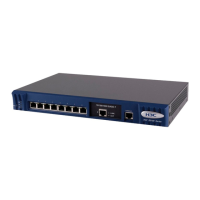Operation Manual – Link Aggregation
H3C S3100 Series Ethernet Switches Chapter 1 Link Aggregation Configuration
1-1
Chapter 1 Link Aggregation Configuration
1.1 Overview
1.1.1 Introduction to Link Aggregation
Link aggregation can aggregate multiple Ethernet ports together to form a logical
aggregation group. To upper layer entities, all the physical links in an aggregation group
are a single logical link.
Link aggregation is designed to increase bandwidth by implementing
outgoing/incoming load sharing among the member ports in an aggregation group. Link
aggregation group also allows for port redundancy, which improves connection
reliability.
1.1.2 Introduction to LACP
Link aggregation control protocol (LACP) is designed to implement dynamic link
aggregation and deaggregation. This protocol is based on IEEE802.3ad and uses link
aggregation control protocol data units (LACPDUs) to interact with its peer.
With LACP enabled on a port, LACP notifies the following information of the port to its
peer by sending LACPDUs: priority and MAC address of this system, priority, number
and operation key of the port. Upon receiving the information, the peer compares the
information with the information of other ports on the peer device to determine the ports
that can be aggregated. In this way, the two parties can reach an agreement in
adding/removing the port to/from a dynamic aggregation group.
Operation key is generated by the system. It is determined by port settings such as port
speed, duplex mode, and basic configurations (refer to
Requirements on Ports for Link
Aggregation
for description on basic configurations).
z Selected ports in a manual aggregation group or a static aggregation group have
the same operation key.
z Member ports in a dynamic aggregation group have the same operation key.
1.1.3 Requirements on Ports for Link Aggregation
To achieve outgoing/incoming load sharing in an aggregation group, the member ports
to perform load balancing must have the same speed, duplex mode, and basic
configurations, which include:
z STP configuration, including STP status (enabled or disabled), link attribute
(point-to-point or not), STP priority, STP path cost, STP packet format, loop guard
status, root guard status, edge port or not.

